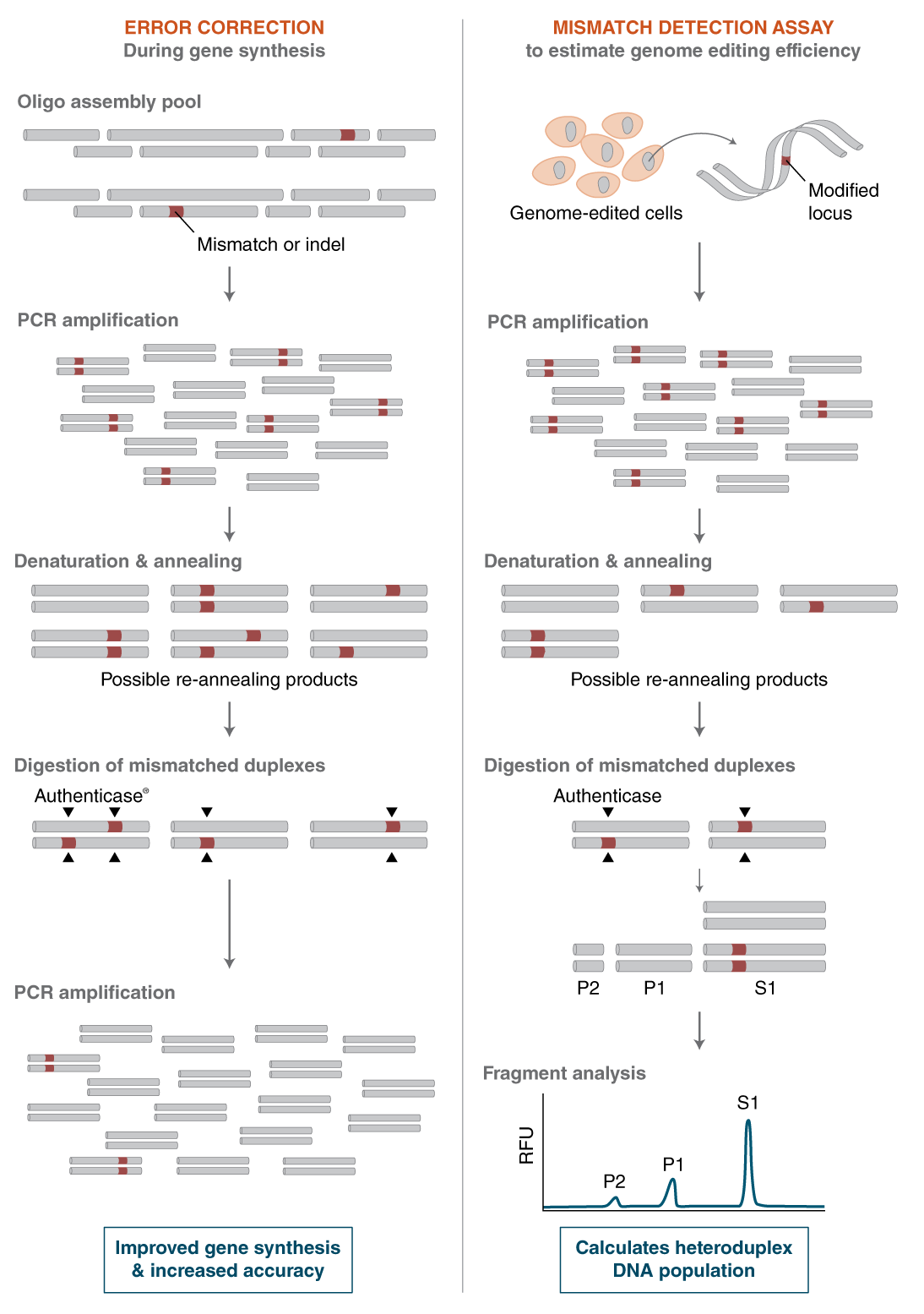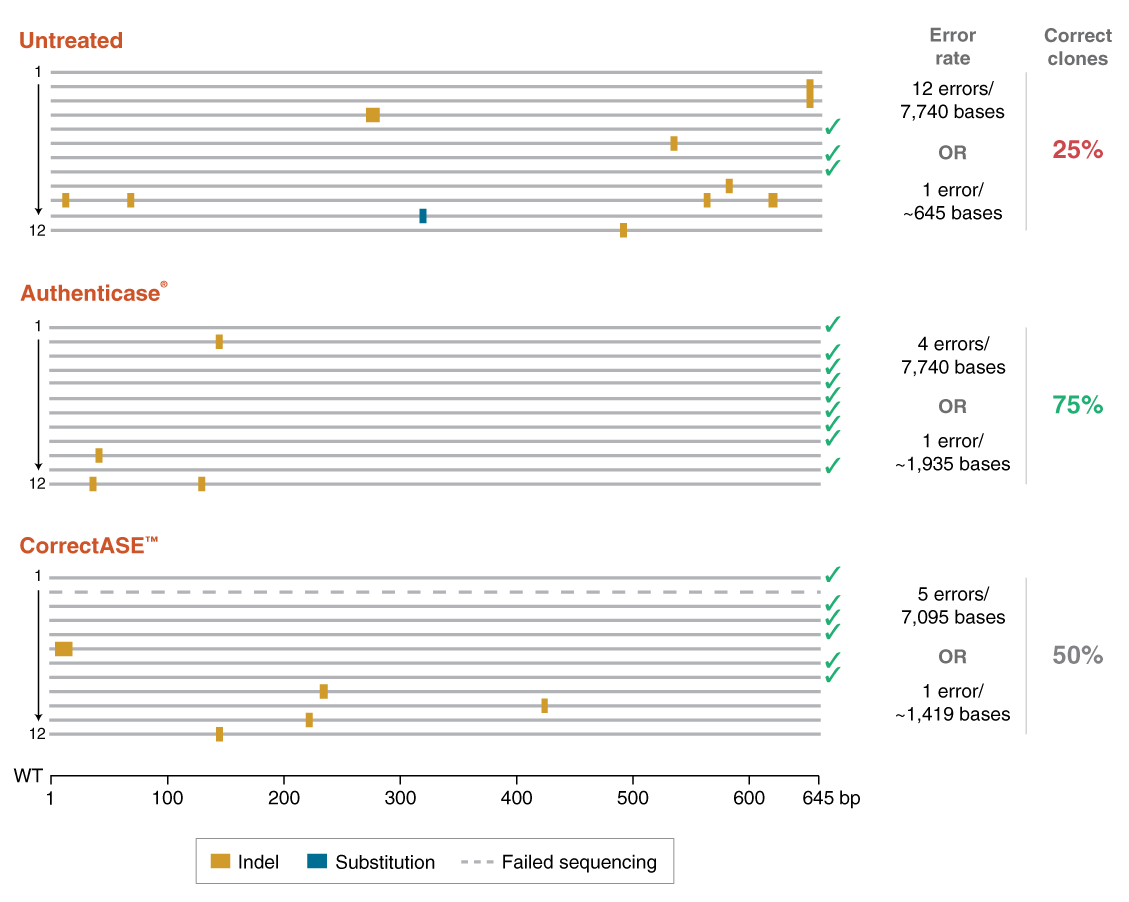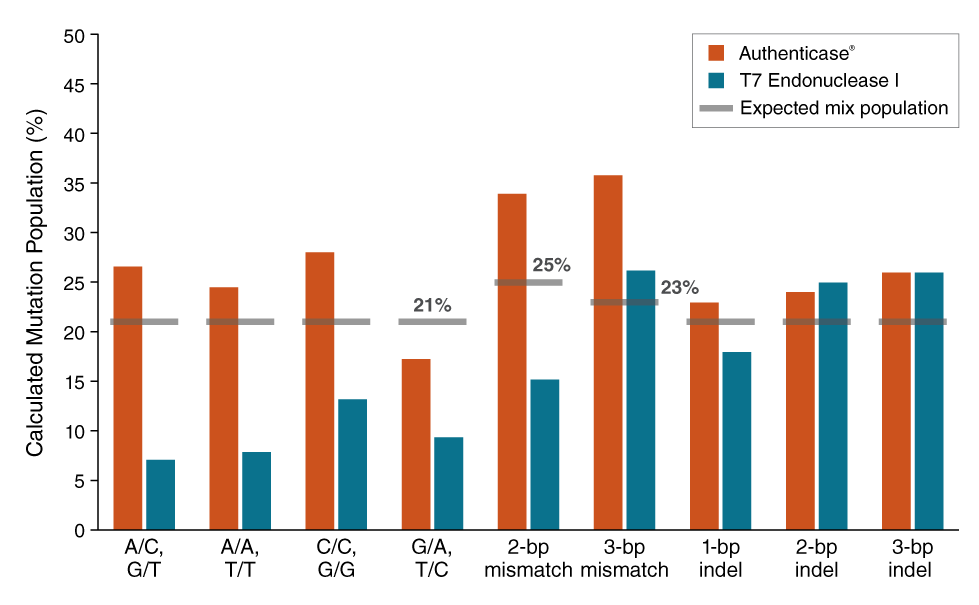Authenticase®
Product information| Code | Name | Size | Quantity | Price | |
|---|---|---|---|---|---|
M0689S |
Authenticase |
25 rxns | - | Unavailable in your region | |
M0689L |
Authenticase |
125 rxns | - | Unavailable in your region |
Authenticase®
Catalog #M0689
Product Introduction

Mixture of structure-specific nucleases capable of recognizing and cleaving outside mismatches and indels
- Recognizes indels (insertions and/or deletions) as well as single base mismatches: C/C, T/C, A/C, T/G, G/G, T/T and A/A
- Applications:
- Error-correction in oligonucleotide synthesis
- Mismatch Detection Assay
- Learn more about how Authenticase can enhance error correction during gene synthesis in our NEB Inspired blog post.
- Product Information
- Protocols, Manuals & Usage
- Tools & Resources
- FAQs & Troubleshooting
- Citations & Technical Literature
- Quality, Safety & Legal
- Other Products You May Be Interested In
Product Information
Description
Authenticase is a proprietary mixture of structure-specific nucleases capable of recognizing and cleaving outside mismatch and indel (insertion and/or deletion) regions, ranging from 1-10 basepairs (bp) on double-stranded DNA. The formulation has limited non-specific activity on homoduplex regions of DNA. Authenticase can be used as an error-correction reagent in oligo-based PCR gene assembly by enzymatically removing “mistakes” prior to the final renaturation and amplification step (i.e. removes mismatch/indel errors caused by oligonucleotide synthesis). Alternatively, Authenticase can replace T7 Endonuclease I in the mismatch detection assay used to assess the efficiency of genome editing.




- This product is related to the following categories:
- Validation of CRISPR-based Gene Editing,
- DNA Repair Enzymes and Structure-specific Endonucleases,
Reagents Supplied
Reagents Supplied
The following reagents are supplied with this product:
| NEB # | Component Name | Component # | Stored at (°C) | Amount | Concentration | |
|---|---|---|---|---|---|---|
Properties & Usage
Reaction Conditions
1X Authenticase Reaction Buffer
Incubate at 42°C
1X Authenticase Reaction Buffer
10 mM Tris-HCl
10 mM MgCl2
100 µg/ml Recombinant Albumin
(pH 8 @ 25°C)
Storage Buffer
10 mM Tris-HCl
500 mM NaCl
1 mM Dithiothreitol
0.1 mM EDTA
50% Glycerol
pH 7.4 @ 25°C
Heat Inactivation
NoFeatures
- Reduces number of colonies that need to be screened and saves time
- Can replace T7 Endonuclease I in mismatch detection assay
Related Products
Companion Products
Protocols, Manuals & Usage
Protocols
Manuals
Tools & Resources
Selection Charts
FAQs & Troubleshooting
FAQs
- What reaction conditions were used to define Authenticase®?
- How does Authenticase® improve the quality and fidelity of PCR gene assembly?
- How do I convert my gene of interest into oligonucleotides?
- Why do you recommend setting up two tubes for the PCR reaction containing different amounts of Authenticase®-treated samples as templates?
- Can I use Authenticase® for genome editing applications?
- Does Authenticase® recognize single base pair mismatches or indels (insertions/deletions)?
- What common additives inhibit Authenticase®?
- What PCR reagents are recommended for DNA amplification in genome editing (CRISPR/Cas9, TALEN, ZFN) mismatch detection assays?
- Can I use Authenticase® genome editing (CRISPR/Cas9, TALEN, ZFN) mismatch detection assays with unpurified PCR products?
- What size PCR amplicon should I design to analyze the genomic editing efficiency?
- If my PCR reaction yield is low, can I add more than 5 µl of the PCR reaction to the digestion reaction?
- Why do I see an extra band when I run the undigested heteroduplex on a Bioanalyzer or agarose gel?
- What are the differences between Mismatch Endonuclease I (NEB #M0678) and Authenticase (NEB #M0689)?
Citations & Technical Literature
Citations
Quality, Safety & Legal
Quality Assurance Statement
Quality Control tests are performed on each new lot of NEB product to meet the specifications designated for it. Specifications and individual lot data from the tests that are performed for this particular product can be found and downloaded on the Product Specification Sheet, Certificate of Analysis, data card or product manual. Further information regarding NEB product quality can be found here.Specifications
The Specification sheet is a document that includes the storage temperature, shelf life and the specifications designated for the product. The following file naming structure is used to name these document files: [Product Number]_[Size]_[Version]Certificate Of Analysis
The Certificate of Analysis (COA) is a signed document that includes the storage temperature, expiration date and quality controls for an individual lot. The following file naming structure is used to name these document files: [Product Number]_[Size]_[Version]_[Lot Number]Safety DataSheets
The following is a list of Safety Data Sheet (SDS) that apply to this product to help you use it safely.Authenticase®
Legal and Disclaimers
Products and content are covered by one or more patents, trademarks and/or copyrights owned or controlled by New England Biolabs, Inc (NEB). The use of trademark symbols does not necessarily indicate that the name is trademarked in the country where it is being read; it indicates where the content was originally developed. The use of this product may require the buyer to obtain additional third-party intellectual property rights for certain applications. For more information, please email [email protected].This product is intended for research purposes only. This product is not intended to be used for therapeutic or diagnostic purposes in humans or animals.
New England Biolabs (NEB) is committed to practicing ethical science – we believe it is our job as researchers to ask the important questions that when answered will help preserve our quality of life and the world that we live in. However, this research should always be done in safe and ethical manner. Learn more.
Other Products You May Be Interested In
The supporting documents available for this product can be downloaded below.




